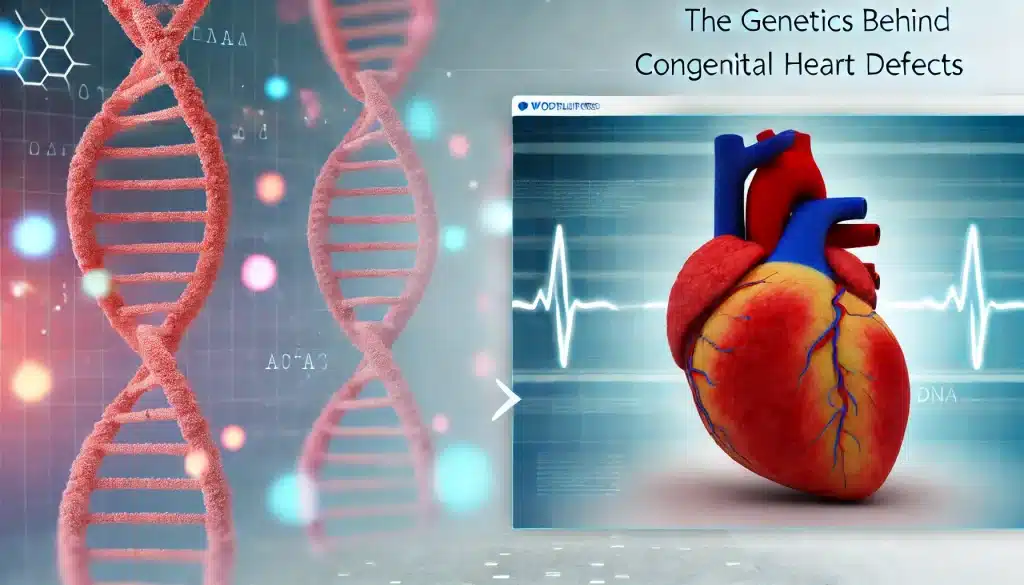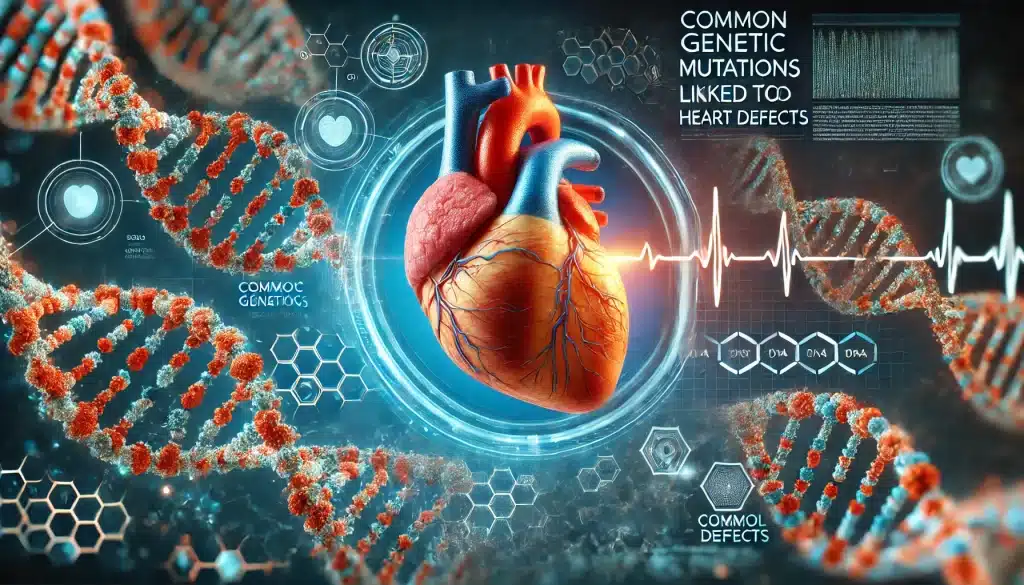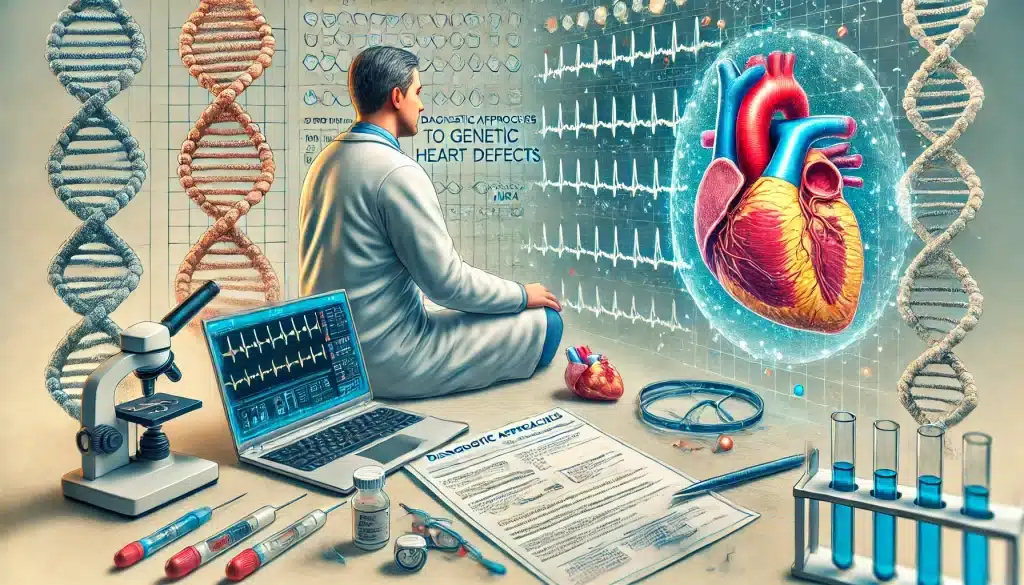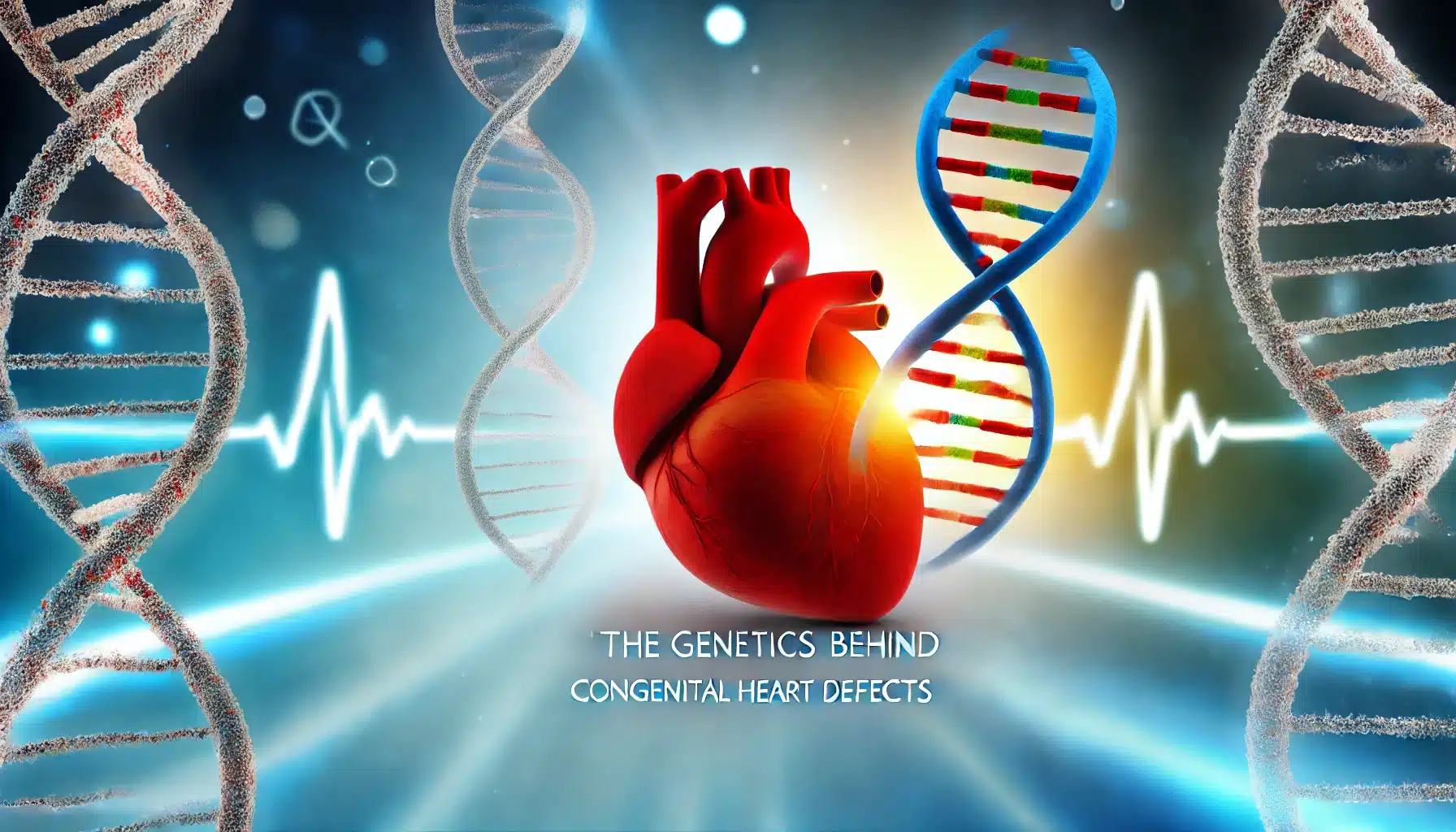What Are Congenital Heart Defects?
Genetics Behind Congenital Heart Defects. Congenital heart defects (CHDs) are structural abnormalities of the heart that are present at birth. These defects can range from simple issues, such as small holes between heart chambers, to severe malformations, such as missing or poorly formed parts of the heart. CHDs are the most common type of birth defect, affecting approximately 1 in 100 newborns.
Understanding the causes of CHDs is complex, as these conditions often result from a combination of genetic and environmental factors. While some defects can be traced to specific genetic mutations, others may be linked to maternal health, lifestyle, or exposures during pregnancy. However, the genetic component plays a critical role in many cases, which makes it essential to explore the hereditary aspects of CHDs.
- CHDs are the most common birth defect globally.
- They can affect the heart’s structure, function, or both.
- Genetic factors are crucial in understanding the origin of many CHDs.

How Genetics Influence Congenital Heart Defects
The role of genetics in congenital heart defects (CHDs) is significant, as many of these conditions are linked to mutations in genes that control heart development. Genetic influences can vary from single-gene mutations to complex interactions involving multiple genes and environmental factors. In some cases, CHDs are inherited directly from parents, while in others, they occur due to spontaneous mutations during early embryonic development.
Approximately 30% of CHDs have an identifiable genetic cause, with the remaining cases resulting from a mix of genetic susceptibility and environmental exposures. Understanding these genetic influences helps in diagnosing, managing, and potentially preventing CHDs in affected families. Key genetic factors involved in CHDs include chromosomal abnormalities, single-gene mutations, and syndromic associations.
- Chromosomal abnormalities such as Down syndrome are associated with higher rates of CHDs.
- Single-gene mutations can directly affect heart development and function.
- Inherited syndromes often include heart defects as part of their clinical presentation.
Common Genetic Mutations Linked to Heart Defects

Several genetic mutations have been identified as contributing factors to congenital heart defects (CHDs). These mutations can disrupt normal heart development by altering the function of crucial genes involved in cardiac formation and structure. Some of the most well-known genetic mutations linked to CHDs include mutations in the NKX2-5, GATA4, and TBX1 genes, among others.
For instance, mutations in the NKX2-5 gene, which plays a key role in early heart development, are associated with atrial septal defects and other conduction system abnormalities. Similarly, mutations in the GATA4 gene are often linked to septal defects and abnormalities in heart chambers. The TBX1 gene, which is part of the 22q11.2 deletion syndrome, commonly leads to defects such as Tetralogy of Fallot and other complex cardiac anomalies.
- NKX2-5 Mutations: Linked to atrial septal defects and conduction issues.
- GATA4 Mutations: Associated with septal defects and chamber abnormalities.
- TBX1 Mutations: Common in 22q11.2 deletion syndrome, leading to complex defects like Tetralogy of Fallot.
Understanding these mutations provides valuable insights into the genetic basis of CHDs, guiding both diagnosis and potential therapeutic interventions.
The Role of Inherited Syndromes
Inherited syndromes often play a significant role in congenital heart defects (CHDs), with certain genetic conditions markedly increasing the risk of these abnormalities. Syndromes such as Down syndrome, Turner syndrome, and Noonan syndrome frequently include heart defects as part of their clinical spectrum, making genetic evaluation crucial for affected individuals and their families.
Down syndrome, caused by an extra copy of chromosome 21, is one of the most common chromosomal abnormalities linked to CHDs. Approximately 50% of individuals with Down syndrome have a heart defect, most commonly atrioventricular septal defects. Turner syndrome, resulting from the partial or complete absence of one X chromosome in females, is associated with a range of heart abnormalities, including coarctation of the aorta and bicuspid aortic valve.
Noonan syndrome is another genetic disorder that commonly involves CHDs, such as pulmonary valve stenosis and hypertrophic cardiomyopathy. This syndrome is caused by mutations in genes involved in the RAS/MAPK signaling pathway, which is crucial for cell division and growth during development. Understanding these syndromes and their genetic underpinnings aids in early diagnosis and tailored management strategies for affected individuals.
- Down Syndrome: High prevalence of atrioventricular septal defects.
- Turner Syndrome: Associated with coarctation of the aorta and other structural defects.
- Noonan Syndrome: Often includes pulmonary valve stenosis and hypertrophic cardiomyopathy.
Environmental vs. Genetic Factors
While genetics play a critical role in the development of congenital heart defects (CHDs), environmental factors can also significantly influence the risk and severity of these conditions. It is often the interplay between genetic predisposition and environmental exposures that determines the likelihood and type of heart defect an individual may develop. Understanding these interactions is essential for identifying potential preventive measures and tailoring interventions.
Common environmental factors that may contribute to CHDs include maternal conditions such as diabetes, obesity, and certain infections during pregnancy. Additionally, exposure to teratogens—substances that can cause developmental abnormalities—such as alcohol, drugs, and specific medications, can increase the risk of heart defects in the developing fetus. However, the impact of these factors often depends on the underlying genetic makeup, which can modulate the body’s response to environmental exposures.
For example, a genetic predisposition might make some individuals more susceptible to the effects of maternal diabetes or exposure to certain medications during pregnancy. Conversely, the presence of protective genetic variants may reduce the impact of environmental risks. This complex interplay underscores the importance of considering both genetic and environmental factors when evaluating the risk of CHDs.
- Maternal Conditions: Diabetes and obesity are linked to increased risk of CHDs.
- Teratogen Exposure: Substances like alcohol and certain medications can cause developmental abnormalities.
- Gene-Environment Interactions: Genetic predispositions can amplify or mitigate environmental risks.
Diagnostic Approaches to Genetic Heart Defects

Diagnosing congenital heart defects (CHDs) with a genetic basis involves a combination of clinical evaluations, imaging studies, and genetic testing. Early and accurate diagnosis is crucial for managing these conditions effectively and providing appropriate counseling for families. Advances in genetic technologies have significantly enhanced the ability to identify the underlying causes of CHDs, allowing for more precise and personalized care.
Clinical evaluations typically begin with a thorough physical examination and a detailed family history to assess any patterns of inheritance. Imaging techniques, such as echocardiography, are essential for visualizing the heart’s structure and identifying anatomical defects. In complex cases, further imaging modalities like cardiac MRI or CT scans may be used to provide more detailed assessments.
Genetic testing plays a pivotal role in diagnosing CHDs with suspected genetic origins. Tests such as chromosomal microarray analysis, whole exome sequencing, and targeted gene panels can detect chromosomal abnormalities, single-gene mutations, and other genetic variations associated with heart defects. Genetic counseling is also a critical component of the diagnostic process, helping families understand the implications of genetic findings, the risk of recurrence, and potential interventions.
- Clinical Evaluations: Involves physical exams and family history analysis.
- Imaging Techniques: Echocardiography, MRI, and CT scans for structural assessment.
- Genetic Testing: Includes chromosomal microarray, whole exome sequencing, and targeted gene panels.
Advances in Genetic Research and Future Directions
Recent advances in genetic research have significantly improved our understanding of the molecular mechanisms underlying congenital heart defects (CHDs). The advent of next-generation sequencing (NGS) technologies, including whole genome and whole exome sequencing, has allowed researchers to identify new genetic variants associated with CHDs. These technologies have expanded our knowledge beyond well-known genetic mutations, uncovering rare and novel variants that contribute to heart defects.
One of the most promising areas of research is the exploration of gene therapy as a potential treatment for certain CHDs. Gene therapy aims to correct or replace faulty genes responsible for heart defects, offering a targeted approach that could complement or even replace conventional surgical interventions in the future. Although still in experimental stages, early studies show promising results, particularly for conditions caused by single-gene mutations.
Additionally, advancements in CRISPR-Cas9 gene editing technology offer the potential to directly modify the genome, correcting genetic defects at their source. This approach holds great promise but also poses significant ethical and technical challenges that must be addressed. As research continues to evolve, the integration of genetic insights into clinical practice is expected to lead to more personalized and effective treatment strategies for patients with CHDs.
- Next-Generation Sequencing: Enhances the discovery of genetic variants linked to CHDs.
- Gene Therapy: Potential to correct faulty genes and treat certain CHDs directly.
- CRISPR-Cas9: A promising tool for gene editing with future therapeutic applications.
Preventive Measures and Risk Management

Preventing congenital heart defects (CHDs) involves a combination of genetic counseling, prenatal care, and lifestyle modifications. While not all CHDs can be prevented, understanding the genetic and environmental risk factors can help in managing and reducing the likelihood of occurrence. Families with a history of CHDs or known genetic predispositions can benefit significantly from tailored preventive strategies and early intervention.
Genetic counseling is a key preventive measure, providing families with information about the risks of CHDs based on their genetic makeup. Counselors can guide prospective parents on the likelihood of passing on genetic conditions and discuss available options, including prenatal testing and reproductive planning. For families at high risk, advanced reproductive technologies such as preimplantation genetic diagnosis (PGD) can help in selecting embryos without genetic defects, reducing the risk of CHDs in offspring.
Maternal health optimization is another crucial aspect of CHD prevention. This includes managing chronic conditions like diabetes and obesity, avoiding harmful substances, and ensuring adequate intake of folic acid and other essential nutrients during pregnancy. Regular prenatal check-ups and early detection of potential risk factors allow for timely interventions that can mitigate the impact of environmental exposures on fetal heart development.
- Genetic Counseling: Helps assess risks and plan for healthy pregnancies.
- Reproductive Technologies: PGD and other techniques reduce the risk of genetic CHDs.
- Maternal Health: Managing chronic conditions and lifestyle factors to minimize risk.
Frequently Asked Questions (FAQs)
What are the main genetic causes of congenital heart defects?
Congenital heart defects (CHDs) can be caused by chromosomal abnormalities, such as Down syndrome, single-gene mutations like those in NKX2-5 or GATA4, and inherited syndromes such as Noonan syndrome. These genetic factors disrupt normal heart development, leading to various structural defects.
Can congenital heart defects be prevented through genetic testing?
While not all CHDs can be prevented, genetic testing can help identify at-risk individuals and guide reproductive planning. Techniques like preimplantation genetic diagnosis (PGD) allow parents to select embryos without known genetic mutations linked to CHDs, reducing the risk in future pregnancies.
Is there a cure for genetic congenital heart defects?
Currently, most congenital heart defects are managed through surgical interventions and medical therapies rather than cured. However, advances in genetic research, including gene therapy and CRISPR-Cas9 gene editing, hold potential for future treatments that could correct some genetic defects at their source.
How do environmental factors interact with genetics in congenital heart defects?
Environmental factors, such as maternal health conditions and exposure to harmful substances during pregnancy, can influence the development of CHDs, especially in individuals with a genetic predisposition. This interaction highlights the importance of both genetic and environmental risk management in preventing CHDs.
What role does genetic counseling play in managing congenital heart defects?
Genetic counseling provides crucial support for families affected by CHDs, offering information about inheritance patterns, recurrence risks, and preventive options. It helps families make informed decisions about reproductive planning and managing the health of affected individuals.

